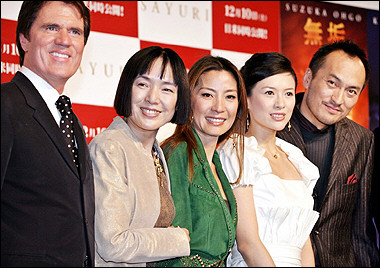|
Culture wars: Chinese actresses, Japanese roles
(AP)
Updated: 2005-12-17 09:24
The makers of "Memoirs of a Geisha" expected to be lauded for creating the
first big-budget Hollywood movie with Asian actors in every leading role.
Instead, they find themselves defending casting decisions that have inflamed
historical tensions between Japan and China.

(L-R)US film director Rob
Marshall poses with the cast of his latest movie 'Sayuri' ('Memoirs of a
Geisha'), Japanese actress Kaori Momoi, Malaysian actress Michelle Yeoh,
Chinese actress Zhang Ziyi and Japanese actor Ken Watanabe at a press
conference in Tokyo. [AFP] |
The
English-language film is set in Japan and adapted from the American novel by
Arthur Golden. It stars Chinese actresses Ziyi Zhang and Gong Li, and
Chinese-Malaysian actress Michelle Yeoh. They join several Japanese performers,
including Ken Watanabe.
For months, the Internet has been filled with vitriolic debate over cultural
insensitivity. The arguments boil down to this: A movie about Japanese culture
should have a Japanese actress in the lead.
The filmmakers, however, thought that would be shortsighted and
discriminatory. Producers Douglas Wick ("Gladiator") and Lucy Fisher, and
director Rob Marshall ("Chicago"), say the casting was an exhaustive, meticulous
process that considered acting ability, star power and physical traits.
The debate is somewhat perplexing considering that actors have been playing
characters of different nationalities throughout the history of film.
"When you saw 'Zorba the Greek,' and you saw Anthony Quinn play Zorba, was
that odd to you because he was Irish and Mexican?" Marshall said. "Or when you
saw 'Dr. Zhivago,' and you saw Omar Sharif, who's Egyptian-born, play a Russian,
was that something that threw you?"
But the symbolism in "Geisha," opening today, is powerful for many Chinese.
During Japan's 1937-38 occupation of Nanjing, Japanese troops killed at least
150,000 Chinese civilians and raped tens of thousands of women.
Today, there is tension over Japanese Prime Minister Junichiro Koizumi's
repeated visits to a shrine that honors some convicted war criminals, as well as
the territorial dispute over the Diaoyutai or Senkaku islands.
In April, Chinese demonstrators took to streets protesting
Japanese textbooks that whitewash the Japan's war atrocities.
Such history has created an Asian climate so sensitive, South Korean actress
Kim Yun-jin of TV's "Lost" reportedly turned down a role in "Geisha" for
nationalistic reasons.
But the American filmmakers had other concerns, like star power and ticket
sales.
Zhang and Yeoh co-starred in the box-office hit "Crouching Tiger, Hidden
Dragon," and Zhang has since become the international face of Chinese cinema
with roles in "Hero," "House of Flying Daggers" and "2046."
Yeoh became the first Asian Bond girl in "Tomorrow Never Dies." And Li gained
a devoted cult following thanks to "Raise the Red Lantern" and "Farewell My
Concubine."
But does casting for charisma's sake mean authenticity is sacrificed?
Marshall is quick to point out that while he did extensive research into geisha
culture, realism was not his chief concern.
"I never intended to do this movie as a documentary-style version of the
novel," Marshall said. "It really is a fable."
|